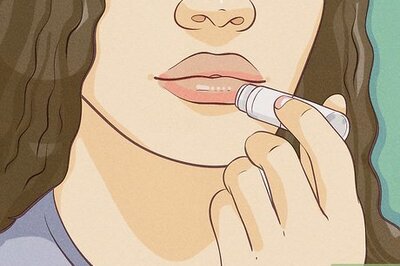
views
20 Characteristics of a Good Friend
They support you in good times and bad. People tend to put a lot of focus on the friends who are there for you when times are tough, but Carmichael emphasizes that a good friend is also "somebody who genuinely celebrates when things go well in your life." A good friend is always in your corner, no matter what. Give this: Show up at the next major thing going on in your friend's life, whether to cheer them on or hold their hand and offer emotional support. Some people are "really afraid to open up and ask people for support because they don't want to burden people, or they feel like people might think less of them if they knew their vulnerabilities," Carmichael notes. But you shouldn't worry about it, she continues, because "asking for small favors actually brings people closer."
They're honest and trustworthy. "A good friend is somebody who's reliable, somebody that you can count on," explains Carmichael. You know you can believe that they mean anything they tell you because they always tell the truth. This is so important that many people consider trustworthiness essential for any relationship. Give this: Avoid overpromising, especially with new friends. If you always do what you say you're going to, people will come to feel that they can rely on you a lot more quickly. "Trust is often built over duration and frequency of contact," Carmichael cautions. It "happens over time and having had some opportunities to be around the person and make sure you know that they are reliable."
They're a good listener. A good friend pays attention when you're talking to them. They know how to listen actively so that you feel heard and understood. If you're acting quiet or withdrawn, they'll likely check in on you because they care about you and want to look out for you. Give this: Next time a friend wants to talk to you about something, put your phone or anything else away and give them your undivided attention.
They treat you with respect. A good friend is considerate of your views and beliefs, even if they don't agree with you. While they might occasionally push you about things or engage in friendly debate about an issue, they don't use your beliefs to insult you or put you down. They recognize that you're an autonomous person with your own thoughts and feelings. Give this: Instead of arguing with a friend you don't agree with, ask them why they believe the way they do. Curiosity paves the way for more understanding (even if you still don't agree with them).
They are patient and accepting. A good friend doesn't expect you to be perfect. They recognize your flaws and either accept them for what they are or figure out a way to work around them. They allow you to make mistakes and figure things out on your own. Give this: Look for ways to accommodate your friends rather than expecting them to change their behavior.
They have a positive outlook. People who have a generally positive outlook tend to be more pleasant to be around. They also make the people around them feel good—and everyone loves a friend who always makes them feel good. A good friend with a positive outlook helps you feel more hopeful about the future and more confident in yourself. Give this: Tell a friend about something you admire them for or something they do really well—pump them up! It'll give both of you a little mood boost.
They encourage you to pursue your goals. Studies show people actually find challenging tasks less stressful when they have a friend by their side. A good friend gives you the motivation and support you need to overcome any obstacles that get thrown in your path. Give this: Offer to come along with a friend when they're doing something they find difficult or that they've been putting off.
They show an interest in you below the surface. Because a good friend wants to get to know you, they're curious about how you think and what informs your perspective. They want to understand you, how you feel, and how you see the world. Give this: Ask a friend what their favorite thing that happened today was. Get them talking about something they enjoy and find out why they enjoy it so much.
They empathize with you and validate your feelings. Empathy is a force that drives human connection. A good friend recognizes that your emotional response to something might be different than theirs and that's okay! They just want you to know that they've got your back. They help you feel supported because they readily acknowledge your feelings and make space for them. Give this: Ask a friend questions to better understand how they're feeling about something rather than assuming.
They are understanding and quick to forgive. Even if a good friend doesn't entirely agree with you, they get where you're coming from. Because of that understanding, they're not going to hold a grudge or keep insisting that you owe them for some slight. Whenever something comes up, a good friend is quick to apologize and make amends if necessary. Give this: Put yourself in a friend's shoes and try to look at things from their perspective so you can understand their reaction better.
You have quite a few interests in common. People tend to want to spend a lot of time with their friends, so being interested in the same things certainly helps with that! You might not necessarily be into all of the same things, but there's definitely a lot of overlap. That gives you a variety of things you can do together without getting bored. Give this: Reach out to someone you frequently see at the same places as you, like that person who's always reading at the library when you are. Find out if you have anything else in common.
You share a sense of humor and make each other laugh. A good friend is somebody who has made you laugh so hard it hurts at least once. Sharing laughter is such a great way to connect with people and when you're with a good friend, chances are one of the other of you (or both!) is going to end up in a fit of giggles. Give this: When you see a meme that makes you laugh, send it to a couple of friends who you think would also find it really funny. This is called "pebbling" and is a way to show someone that you care for them.
You stick up for each other and tend to take each other's side. A good friend is as loyal as the day is long. Nobody's going to mess with you as long as they're around—they're your true ride-or-die. And it goes without saying that if somebody's giving you a hard time, they're going to come to your defense. Give this: If you have a hard time sticking your neck out, try standing up for yourself or for a friend in a low-pressure situation, such as during a friendly debate. This will give you more courage to stick up for yourself and others.
You feel light and uplifted when you're around each other. If someone is a good friend, it actually improves your mood to be with them, even if you're going through something more difficult. Because you know you can be yourself around them, they help you feel good about who you are and believe in yourself. Give this: Go hang out with a friend who's feeling down to see if you can help lighten their mood.
You keep each other's secrets. This is another aspect of loyalty—a good friend just isn't going to go around telling people your business. And because you know your secrets are safe, you feel totally comfortable opening up to each other. Give this: If someone brings up something a friend told you in confidence, simply say "that's not my story to tell" and change the topic.
You make time for each other. It might seem like everybody's really busy, but a good friend is willing to put life on pause for a moment if you need them. You know that you're important to them because they go out of their way to check in on you and plan dates to hang out on a regular basis. Give this: Schedule a weekly date with a friend to show them that you want them to be a regular part of your life.
You respect each other's boundaries. A good friend recognizes your autonomy and doesn't pressure you to do anything that you don't want to do. You feel comfortable telling a good friend "no" because you know they won't get upset about it. A good friend isn't going to ask you to do anything that they think would likely make you feel uncomfortable. Give this: When a friend tells you they don't want to do something, drop the issue immediately and move on to something else.
You feel comfortable around each other. A good friend is someone that you always feel like you can be yourself around. You don't have to put up a front to get them to accept you. Instead, you feel free to relax and aren't afraid to open up and be vulnerable as a result. Give this: Open up to a friend and tell them something personal that they don't know about you. It will help them feel more comfortable opening up to you if you open up to them first.
You enjoy deep, meaningful conversations with each other. In a healthy platonic relationship, both you and your friend feel like you can talk about anything with each other. You know that you're safe being vulnerable and that your friend will protect you and support you no matter what. That gives you the courage to talk about even the most difficult topics. Give this: Share something with a friend that you've always been ashamed of about yourself. Then, brainstorm ways to unpack and get rid of the shame you feel around that thing.
You do things to show that you care and value each other. A good friend is someone whose feelings you never question. You know that they care about you and that you're an important part of their life because they show up for you. Give this: Anticipate something that a friend will need and get it or do it for them.
Signs of a Toxic Friend
They bully or belittle you. Someone who insults you or makes fun of you isn't much of a friend at all. Carmichael notes that this includes "the frenemy… somebody who kind of makes subtle digs in a little bit of a competitive way." What you can do: Refuse to tolerate this kind of behavior. If someone you consider to be a friend is bullying you, stand your ground and tell them on no uncertain terms that they can't push you around.
They drain your energy. Over time, trying to maintain a friendship with someone who is toxic can be extremely exhausting—both mentally and physically. A friend who is toxic to you causes you stress, which can take a pretty serious toll on your physical and mental health if you hang around them too often. What you can do: If you want to continue some level of friendship, at least limit the time you're around someone if they're draining you like this—and definitely avoid one-on-one hangs.
They take advantage of you. It might seem like they only ever reach out to you when they need something and ignore you otherwise. They might always accept your generosity but never offer anything in return. A toxic friend might also take advantage of you by always leaning on you for emotional support but making themselves scarce when you're going through something. What you can do: Set firm boundaries and tell them "no" firmly and directly when you're not willing to do something they want you to do.
They gossip about you to other people. It can be heartbreaking to hear something from someone else that you'd only told to a friend you thought you could trust. A toxic friend unfortunately feels free to spread your business around, which means you don't feel comfortable being open with them. What you can do: Let them know that you don't appreciate them sharing the things you tell them in confidence with other people. You might want to avoid confiding in that person or telling them anything that you wouldn't want everyone to know.
They hold you back or dim your light. A good friend encourages you and lifts you up because they actually want you to succeed. A toxic friend is too wrapped up in themselves. They likely think that if you succeed, they'll look bad by comparison, so they'll do anything to knock you down a peg. For example, a toxic friend might say, "Are you kidding me, talking about entering that competition? You stand no chance!" What you can do: Tell them that you don't appreciate what they did or said. For example, you might say, "That was uncalled for." If they're interested in preserving the friendship, they'll do what they can to make amends.
They don't show any interest in you. "We've all had friends, where it's almost like, we feel like we're chasing them," Carmichael explains. "We're always the person to reach out to them, to call them, to invite them, and they never seem to call us or invite us." "It's almost as if it's a one-sided friendship," Carmichael continues. "You feel like the friendship would almost not even exist if it weren't for you constantly holding it up and inviting the other person." What you can do: "Ask the person about it," Carmichael advises. "Some people, they just don't reach out as much, and it doesn't necessarily mean anything." But if you mention it and they really care for you, she continues, then they would want "to let you know that they do value your friendship." At the same time, Carmichael cautions, if the person doesn't respond in a reassuring way, the friendship "can almost become more of a source of insecurity than a source of support."
How to Find Good Friends
Become active in your local community. Getting involved with community events well help you feel more connected—and you can also make some great friends! People who are local to you are going to be easier for you to spend time with and you might find that you actually have a lot in common with them. Even neighbors that you don't actually have a lot in common with are people that you can learn from to expand your horizons and experience different perspectives. Working on community projects or volunteering to help those in need in your area is also a great way to meet others who share your values.
Get involved in groups and events related to your interests. People tend to gravitate toward other people that they have something in common with. Joining a group that's related to an interest of yours is a great way to meet other people that you have at least one thing in common with. And often, you'll discover that you have a lot of other things in common as well. If you're religious, joining a church in your area is a great way to make new friends while you grow spiritually. Your local library often has information about different clubs, interest groups, and community organizations you can join.
Be the friend to others that you want others to be to you. The best way to find good friends is to exhibit all of those characteristics that you want to see in a good friend. When you treat other people that way, they'll be naturally inclined to treat you that way. For example, if someone has a difference of opinion with you, you might ask them questions to understand more about why they feel the way they do rather than automatically attacking their point of view or condemning them.



















Comments
0 comment